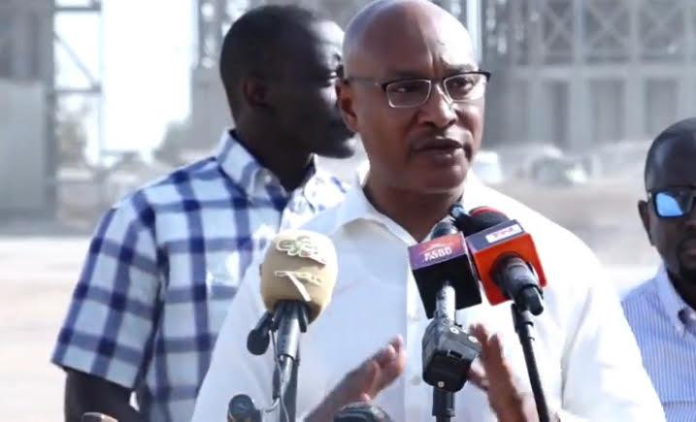By Mustapha Jallow
Mr. Momodou Hydara, the Managing Director of Jah Oil Company on Monday, June 3, 2024, strongly denied widespread claims that there is a shortage of cement in The Gambia.
Mr Hydara’s strong denial came in the wake of an alarm raised by Cement Importers that there could be a shortage of cement and an eventual increase in the price of the product in the country. The association further alleged that Jah Oil and other cement factories in the country are being favored by the government.
The allegations by Cement Importers came following the government’s decision to increase VAT on cement import from D30 to D180 per bag.
While clarifying the above claims by Cement Importers during a press conference at the company’s headquarters in Brikama, Mr Hydara said Jah Oil Company can produce 100,000 bags of cement a day.
“Jah Oil can produce enough cement to supply the entire country in just three days. We can do this because our capacity is massive. Just on Sunday, there was a long queue of vehicles at the factory, but they were all loaded and dispatched,” he said. Hydara said there is a massive campaign funded by some Senegalese business tycoons to kill the cement industry in The Gambia.
“Cement importers in the country are financed by Senegalese business moguls who are raking all the profits. This is why you always hear that there is a shortage of CFA here and there. Even the trucks they are using are owned by these Senegalese, but they registered them with Gambian number plates because those vehicles do not meet the requirements to be registered in Senegal,” Mr. Hydara alleged.
“So those who are saying we cannot supply enough cement for the country’s consumption are misinforming the people. They have started a campaign that we are increasing our prices which is not true because we have never gone beyond D355.00 on our wholesale price,” Hydara said.
He said Jah Oil has been a victim of unfair criticism by some businesses due to their competitive business nature.
“If we were favored by the government, we would not have been out of business in 2023. We closed down our factory because the conditions were not favorable to us,” he said.
He said the Company’s concept and principle of doing business is to make a small profit and help others to grow.
“This is why Jah Oil has always had the most competitive prices. But our competitors do not want us to do these things because is not in their interest. They feel that we are destroying the market by coming up with such competitive prices,” he said. Mr. Hydara said in most cases when there is a shortage of cement, the government and private construction companies rely on Jah Oil to rescue the country.
“Gambians should be assured that with Jah Oil in operation, there will never be shortage of cement in the country. We have done a lot of work around this and that is why we have tried to engage all cement importers to reach a compromise with them, but the conditions they brought forward are too unfriendly that we cannot even entertain them,” he said. Mr. Hydara said the country’s cement importers are aware that Jah Oil can produce enough cement, but they are refusing to work with the company because it refuses to give them the incentives they are getting from Senegal. He urged Gambians to put their differences aside and support Gambian-owned businesses to help build the economy. Mr. Hydara also gave a rundown of how the proprietor of the Company, Mr Hamidou Jah started his business from a humble background to become one of Gambia’s leading businessmen.
On Taxes:
Reacting to the cement importers’ claims that they pay D6 million on taxes every day, Mr. Hydara said this figure does not tally with the amount of cement imported into the country in 2023.
“If you look at the 227,000 metric tons of cement they imported into the country in 2023, you will realise that they paid over D170 million on taxes. Where is the remaining D200 million that they claimed to have paid?” Mr. Hydara asked. He said in the month of May alone, Jah Oil Company paid D70 million as tax on cement. “We are doing everything to fight for the Gambia,” he said, adding that the majority of those involved in the import of cement are not Gambians.
“You see, we should protect Gambian factories. We cannot allow other countries’ products in our market when they do not allow ours to enter their country’s market with their products. If there is free trade of goods between all West African states, we should all respect the agreement,” Mr. Hydara concluded.


















